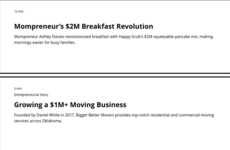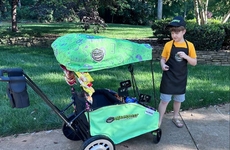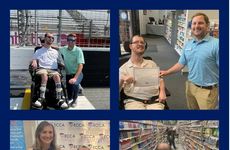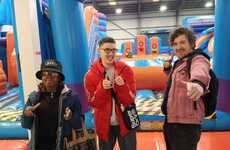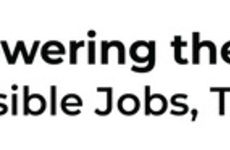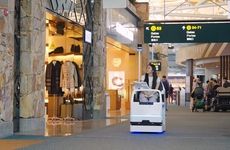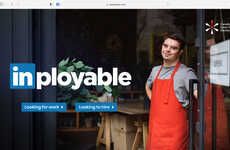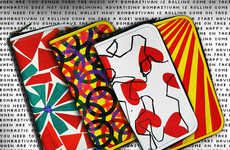
Teaching Tech Skills to Disabled Youth
Bianca — April 9, 2012 — Social Good
References: bfworkshop
Peter Cousins is the founder of Brighter Future Workshop, a social enterprise that empowers and employs disabled youth by teaching them tech skills, which they apply to recycle mobility equipment that would otherwise end up in the landfill.
In the interview below, Peter shares his story about becoming a social entrepreneur, which began after a spinal condition left him requiring a wheelchair himself. Wanting to find an empowering solution for others facing disability, he launched Brighter Future Workshop, which has since recycled over 6,500 pieces of mobility equipment and won awards like The Queens Award for Enterprise in 2011.
5 Questions With Peter Cousins, Founder of Brighter Future Workshop
1. Where did the vision for BFW come from?
To turn our ideas into reality we exploited a totally new innovative and unique recycling operation with no competitors. We had a clear vision for change in two critical areas: provide training to young disabled people to enable them to have better chances in life, and to reduce the amount of reusable mobility equipment that ends up in landfills. By recycling items like wheelchairs, power chairs, scooters, rise and recline chairs and beds in our workshop, we can return the equipment back to the disabled community at an advantageous price.
2. What happens with the recycled mobility equipment?
When recycled it is sold back at an affordable price to needy disabled people in the community. Wheelchairs and electric mobility scooters, for example, give them their independence back, enabling them to function within the local community. We have provided 3,000 day-training places to young disabled people thrown on life’s scrapheap. Trainees work alongside technicians recycling the equipment.
3. How does BFW empower its youth employees?
Brighter Future helps them forge a new life for themselves enabling them to work towards their own economic stability, helping them improve their quality of life. Using these methods, those who many may have considered un-trainable can become highly motivated. Giving them the right training, time and encouragement can lead to them playing a fuller role in society, enhancing their own lives.
We believe if someone has long-term disabilities, you don't train them without first helping them believe in themselves to function with a positive role within our workshop and the community in general. The integration of trainees is a large factor in making them socially aware and included. Each group begins to develop empathy about other people’s individual needs; they then focus less on their own problems and work together as one group, consequently forming a stronger bond. The overall lessons learned within this group are to be more tolerant and understanding of others and their needs. They are then able to take their new found skills out in to the wider community promoting better health and the feel good factor.
4. How did the idea for the business model come about?
We developed an innovative way to combine the very best methods of enhancing the lives of people with disabilities within the community, whilst operating a successful business model that matches or betters many for-profit companies.
This hybrid was the way forward. I became a social entrepreneur, combining both the best of profit and non-profit companies whilst dealing with disability issues in community with very positive results. BFW empowers and plays an important role in building stronger and more inclusive communities by training young disabled people who work in our workshop. They learn hands-on skills including basic electronic and mechanical engineering, as well as confidence-building life skills, while at the same time recycling mobility equipment. It's all done under the guidance and control of qualified technicians, offering our trainees a better chance in life and helping their development, which leads to a better quality of life.
5. How did you decide to join this sector?
I was a marathon runner and fitness freak until I was forced to take ill health retirement when I developed a spinal problem at age 50. I became house bound for over 15 months due to the lack of a suitable wheelchair available from the NHS, which made me angry and bitter.
This was the lowest point in my life as I quickly learned the problems encountered when one loses mobility. I slowly became aware of other disabled people who had lost their mobility and who could not champion their own cause, and who become socially excluded with no way forward.
I watched a severely disabled young man get out of his wheelchair and slide onto the floor; he had a spanner in his hand and was repairing the fault, with the biggest smile and a look of pride in his achievement.
That's when I had the eureka moment and the idea for The Brighter Future Workshop was born!
In the interview below, Peter shares his story about becoming a social entrepreneur, which began after a spinal condition left him requiring a wheelchair himself. Wanting to find an empowering solution for others facing disability, he launched Brighter Future Workshop, which has since recycled over 6,500 pieces of mobility equipment and won awards like The Queens Award for Enterprise in 2011.
5 Questions With Peter Cousins, Founder of Brighter Future Workshop
1. Where did the vision for BFW come from?
To turn our ideas into reality we exploited a totally new innovative and unique recycling operation with no competitors. We had a clear vision for change in two critical areas: provide training to young disabled people to enable them to have better chances in life, and to reduce the amount of reusable mobility equipment that ends up in landfills. By recycling items like wheelchairs, power chairs, scooters, rise and recline chairs and beds in our workshop, we can return the equipment back to the disabled community at an advantageous price.
2. What happens with the recycled mobility equipment?
When recycled it is sold back at an affordable price to needy disabled people in the community. Wheelchairs and electric mobility scooters, for example, give them their independence back, enabling them to function within the local community. We have provided 3,000 day-training places to young disabled people thrown on life’s scrapheap. Trainees work alongside technicians recycling the equipment.
3. How does BFW empower its youth employees?
Brighter Future helps them forge a new life for themselves enabling them to work towards their own economic stability, helping them improve their quality of life. Using these methods, those who many may have considered un-trainable can become highly motivated. Giving them the right training, time and encouragement can lead to them playing a fuller role in society, enhancing their own lives.
We believe if someone has long-term disabilities, you don't train them without first helping them believe in themselves to function with a positive role within our workshop and the community in general. The integration of trainees is a large factor in making them socially aware and included. Each group begins to develop empathy about other people’s individual needs; they then focus less on their own problems and work together as one group, consequently forming a stronger bond. The overall lessons learned within this group are to be more tolerant and understanding of others and their needs. They are then able to take their new found skills out in to the wider community promoting better health and the feel good factor.
4. How did the idea for the business model come about?
We developed an innovative way to combine the very best methods of enhancing the lives of people with disabilities within the community, whilst operating a successful business model that matches or betters many for-profit companies.
This hybrid was the way forward. I became a social entrepreneur, combining both the best of profit and non-profit companies whilst dealing with disability issues in community with very positive results. BFW empowers and plays an important role in building stronger and more inclusive communities by training young disabled people who work in our workshop. They learn hands-on skills including basic electronic and mechanical engineering, as well as confidence-building life skills, while at the same time recycling mobility equipment. It's all done under the guidance and control of qualified technicians, offering our trainees a better chance in life and helping their development, which leads to a better quality of life.
5. How did you decide to join this sector?
I was a marathon runner and fitness freak until I was forced to take ill health retirement when I developed a spinal problem at age 50. I became house bound for over 15 months due to the lack of a suitable wheelchair available from the NHS, which made me angry and bitter.
This was the lowest point in my life as I quickly learned the problems encountered when one loses mobility. I slowly became aware of other disabled people who had lost their mobility and who could not champion their own cause, and who become socially excluded with no way forward.
I watched a severely disabled young man get out of his wheelchair and slide onto the floor; he had a spanner in his hand and was repairing the fault, with the biggest smile and a look of pride in his achievement.
That's when I had the eureka moment and the idea for The Brighter Future Workshop was born!
Trend Themes
1. Empowering Disabled Youth Through Tech Skills - Social enterprises can teach tech skills to disabled youth, empowering them to recycle mobility equipment and have better chances in life.
2. Innovation in Recycling Opportunities for Mobility Equipment - Creating unique, innovative recycling operations for mobility equipment can reduce waste in landfills while providing affordable equipment for needy disabled people.
3. Combining Profitable Business Models with Social Enterprises - Creating hybrid business models that combine the best of profit and non-profit companies can empower and train young disabled people who work in the workshop, while also recycling mobility equipment.
Industry Implications
1. Social Enterprises - Social enterprises can address important societal issues by empowering disabled youth and reducing waste through the recycling of mobility equipment.
2. Tech Skills Training - Tech skills training programs aimed at training disabled youth is an innovative way to empower them with skills and abilities to work and contribute to society.
3. Mobility Equipment Recycling - Creating innovative ways to recycle mobility equipment can address social issues while also offering affordable mobility options for disabled people.
0.7
Score
Popularity
Activity
Freshness


